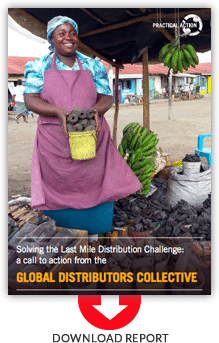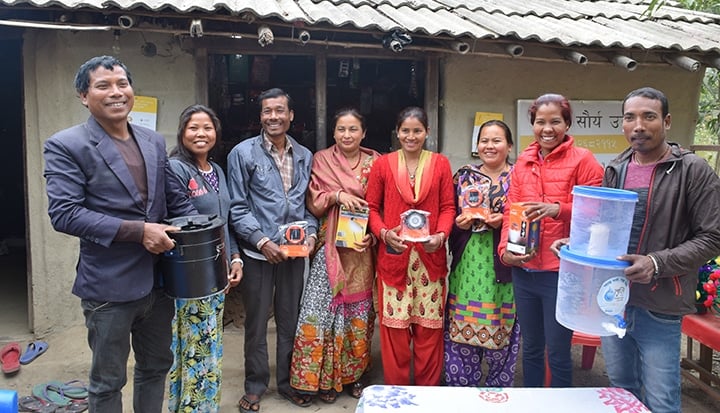By Emma Colenbrander, Practical Action
Billions of people worldwide lack access to everyday products that are fundamental to a better life. Products like solar lights, water filters and clean cooking solutions are transformative for poor families, and essential to achieving the Sustainable Development Goals.
A range of businesses – called ‘last mile distributors’ – work to deliver these technologies to poor customers, using a variety of channels. These businesses also play a critical role in generating employment opportunities in geographies and markets where economic opportunities are scarce. However, last mile distributors face enormous challenges, preventing them from operating sustainably and at scale. These barriers are common across both geographies and product lines, and include low customer incomes, market remoteness, difficulties recruiting/training/retaining sales talent, poor access to finance, high taxation on imported products, lack of market intelligence and limited investor experience in the sector.
 There is increasing interest amongst financiers in supporting last mile distribution businesses. However, the tools that are used to do so – such as challenge funds and results-based financing schemes – tend to be sector-specific (eg. energy only) and available to a very small number of big businesses.
There is increasing interest amongst financiers in supporting last mile distribution businesses. However, the tools that are used to do so – such as challenge funds and results-based financing schemes – tend to be sector-specific (eg. energy only) and available to a very small number of big businesses.
This is problematic for two reasons:
- it forces last mile distributors to compete against product-oriented companies, which are preferred by investors because they are bigger, lower risk and better understood
- it excludes the large number of smaller firms found downstream in last mile distribution, who do not receive support because of the higher risks, higher transaction costs, and increased company ‘churn’ – despite the fact they are far more likely to be reaching the poorest consumers.
To effectively channel resources to last mile distribution, and support a greater variety of more context-specific models in the hardest-to-reach markets, different approaches are needed – ‘collective’ approaches, which make support available to the distribution sector as a whole.
The time has come to refresh the conversation about last mile distribution.
This is where the Global Distributors Collective (GDC) comes in. The GDC is a new initiative that has been developed over the past year in consultation with over 100 organisations from across the sector. It is being incubated by Practical Action alongside implementing partners Hystra and BoP Innovation Center, and over 30 supporting partners.
The GDC is a curator, ‘one-stop shop’ and community of practice to support the last mile distribution sector. It has three main objectives:
1. Provide support services to distributors to help unlock efficiencies and economies of scale.
This includes:
- support in identifying and sourcing products, by building out a product database that provides distributors with the information they need to make informed choices about what products they sell, including retail pricing, availability by region, import requirements, and stage of product development.
- support in securing good terms and pricing on products, by standardising terms and contractual relationships, aggregating distributor product orders and working with suppliers to streamline orders and reduce transaction costs
- support in accessing affordable training services, by building an online training resource hub for the sector, developing new material to plug critical gaps, and working with partners to provide better online and offline training services for distributors
2. Facilitate match-making and collaboration, enable the exchange of information and expertise, and drive research and innovation
This includes:
- developing a comprehensive database of distributors, to support match-making efforts between distributors, as well as providing suppliers with more information on distribution partners in their target geographies, and giving funders better insights into different companies they could support.
- hosting low-cost, local events between distributors to share experience and learning and kickstart new partnerships
- collating existing research from across the sector, summarising key views and learnings on last mile distribution, highlighting priority research needs in the sector, and support those organisations undertaking research to ensure findings inform distributor thinking and practice.
3. Act as a collective voice to ensure distributors’ voices are heard, helping to attract investment and shape policy.
This includes:
- developing standardised business performance and impact metrics/tools, helping create a common language across the sector for the measurement, analysis and reporting of performance and social impact
- developing specific recommendations around capital spending, to help investors and donors understand how they can best stimulate, scale, stabilise or support long-term maturation of the last mile distribution sector
- galvanising support for demand-side and awareness challenges of last mile markets, including greater adoption and use
- developing and disseminating guidance on the state of the sector and recommendations on national policy issues that affect last mile distributors, such as taxation and importation, to inform decision-making processes.
The GDC is emerging as the leading entity representing the interests and needs of last mile distributors around the world. It is building out a database of last mile distributors from across Africa, Asia and Latin America, and will work closely with this group as well as supporting partners in both design and delivery of key activities.
The GDC will use a blended revenue model, with many activities initially funded through grant or concessional finance but shifting to a commercial model with revenue from paid-for services and margins from services.
The GDC represents an opportunity to impact the world’s poorest and most underserved communities in a way that has never been done before and with tremendous reach and scale. We are excited about building a coalition that can translate this opportunity into action.
For more information visit https://practicalaction.org/global-distributors-collective.
Contact GD*@pr*************.uk to discuss partnership opportunities.










